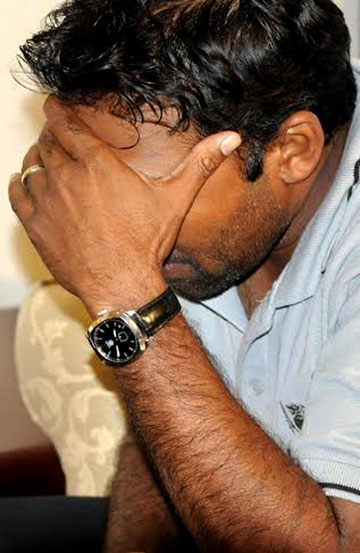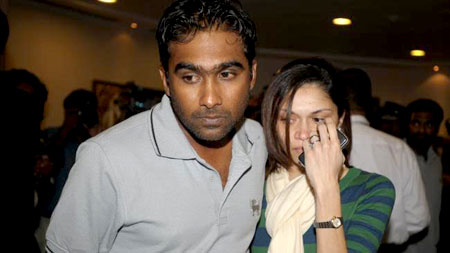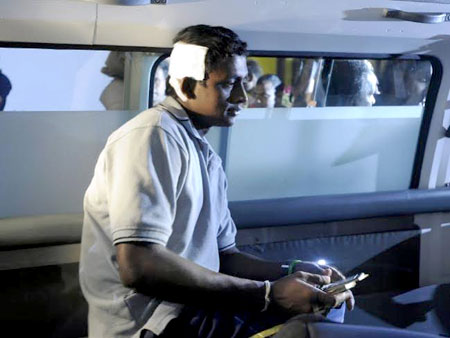I was thinking we were all going to die
Mahela Jayawardene recalls his brush with death on a
bullet-ridden bus in Lahore:
by Richard Earle
|

Mahela Jayawardene with his head in his hands as he returns
to Colombo in 2009 following the team's escape from a
terrorist attack in an ambush outside a cricket stadium in
Pakistan. AFP photo/Ishara S. Kodikara |
Having faced death on a bullet-ridden bus, Sri Lanka doyen Mahela
Jayawardene is cricket's 'big picture' guy.
Then skipper of the Sri Lankan team, Jayawardene believed his gallant
unit would become cricket's saddest tale during the 2009 Lahore terror
attack as rockets, grenades and gun fire enveloped Sri Lanka's stranded
tour bus.
Every ruthless act from Paris to Sydney's Martin Place now haunts a
man who knows the outreaches of humanity where survival hinges on the
whim of gun-wielding extremists.
"It is innocent people and you feel helpless, you don't know what to
do, just hoping you won't get killed," 149-Test legend Jayawardene told
The Sunday Mail.
"Every attack that happens, I sympathise with every one, the
families. It is a sad situation to be in, just innocent bystanders."
A dozen terrorists had ambushed the Sri Lankan tour party en route to
Gaddafi Stadium for the third day of the second Test against Pakistan in
March, 2009.
This wasn't cricket but murder on the highway.
Slumped bodies became islands in a stream as blood wound through the
carriage of a bullet ridden tour bus.
Bones were exposed and flesh shredded by relentless AK-47 rounds.
Jayawardene's wife Christina would hear the carnage unfold on her
husband's cell phone.
"I was calling but she just got the voicemail as the phone was busy.
My phone fell and the whole attack was recorded for 30 seconds. We did
listen to it afterwards to go through it. It was a very tough
situation," said Jayawardene who escaped with deep bullet wounds to an
ankle.
Lashkar-e-Taiba, an Islamic terror group had issued a decree against
playing cricket in Pakistan and ambushed the Sri Lanka team bus as it
passed Lahore's Liberty square with a battery of weapons.
By Jayawardene's next call home six police and two civilians were
killed. Five teammates were injured including close mate Kumar
Sangakkara, Thilan Samaraweera, Tharanga Paranavitana, Ajantha Mendis,
Chaminda Vaas and Suranga Lakmal
Returning from the lottery of Liberty Square required a lucky ticket
that Jayawardene thought he cashed as a Sri Lankan Test star travelling
the world.
A different torment
"For someone to be alive and here, someone was looking after me,"
said Jayawardene, a vaunted big match performer forced to take charge of
a personal horror movie.
"Otherwise we would have been all dead. We are very lucky. It is
something you don't want to go through again or think about."The
previous low point in Jayawardene's life had come years earlier when
cancer claimed 16-year-old brother, Dhishal. It was a tragedy that
troubled Jayawardene long after earnestly repaying medical bills that
ravaged a family desperate to save a son.
Lahore signalled a different torment.
Sri Lanka's three decade civil war meant Jayawardene was no stranger
to violence but the sound of guns clattering and whirl of explosives in
Lahore will never leave him.
"Presidential" grade security failed to protect a bus that was
rendered stationary and defenceless until a heroic driver restarted the
vehicle, driving 1km to the relative safety of Gaddafi Stadium.
"I was thinking we were all going to die when the shooting started
and all the commotion. We were just like sitting ducks," recalled
Jayawardene, who thought Australian umpires Simon Taufel and Steve Davis
were also doomed in a mini-van trailing the bus.
"We didn't have anyone to protect us, no assistance. We were just
lying on a bus hoping we weren't going to get hit.
"I had shrapnel wounds on the ankle and other places. There were guys
screaming, getting hit. People were just hoping they were not going to
get hit. It wasn't pleasant.
Bad situation
"It was only when we got back to the grounds that we thought we were
OK but you could still hear the shots."
Sri Lanka had toured in a bid to nourish the game in strife torn
Pakistan where other teams wouldn't venture. India had abandoned a
scheduled visit against its traditional foe in the aftermath of the
November 2008 Mumbai terror atrocity.
Australia hadn't toured since Mark Taylor's ensemble in 1998 due to a
clear and present security risk. New Zealand's 2002 visit had been
aborted following a hotel bomb attack.
To represent, then lead Sri Lanka was the ultimate honour for
Jayawardene, crack keeper-batsman and esteemed leadership successor
Kumar Sangakkara who both exceeded 10,000 Test and one-day runs.
It's a commitment that contrasts with the pay dispute impasse that
has resulted in a weak West Indies side blighting this Australian Test
summer.
"Obviously it was a bad situation but we just wanted to get on the
park and start playing," said Jayawardene, who steered Sri Lanka to the
2007 World Cup final against Ricky Ponting's invincible Australians in
the Caribbean.
|

Mahela Jayawardene hugs his wife Christina Sirisena shortly
after returning to the country
in 2009 after escaping assassination in an ambush outside a
cricket stadium in Pakistan |
"That's what Sri Lankans are about, we just love playing cricket. It
doesn't matter if we have issues with our cricket boards, we just want
to play cricket for our country.
"We are very proud to have played for Sri Lanka rather than what we
have done in the game."
Jayawardene hopes Pakistan can end its unsettling existence as
perpetual cricket nomad but notes there's no road map home in a climate
of fear.
"I do feel for the Pakistan public who have been starved of cricket
for so many years," said Jayawardene.
"It will be a very courageous move if someone decides to go there but
I am not an expert on security and wasn't the time when it happened.
"The situation we were put in was very difficult."
The future of Test cricket and double-edged saviour that is Twenty20
seems trivial in the context of the Lahore bloodshed.
The mundane assumes a special appeal to those denied it.
"Once you go through something like Lahore it makes everything else
seem ordinary," said Jayawardene, the No. 3 anchor in Sri Lanka's 2014
World Twenty20 triumph.
"I thought I would have been killed and after that I was able to go
and play several World Cups including a T20 title for my country. You
are blessed, very lucky to do that."
Regrettably, the threat of attack extends to the Melbourne Cricket
Ground which has turned from a field of dreams to a concrete fortress
this week. Terror knows no boundaries.
Jayawardene, an article of elegance through 11,814 Test runs and 34
centuries, wants cricket to endure just as Parisians refuse to be scared
away from an envied café culture.
Jayawardene is a key proponent for cricket's admission to the
Olympics through the T20 format which will be decided by the
International Olympic Committee in 2017.
It's time to be bold.
"That would be great. Cricket is the second largest sport after
soccer so why aren't we in the Olympics?" said Jayawardene, "Obviously
the Olympics mean countries will have to introduce cricket and you get a
lot of mileage out of that. Countries could watch and get excited about
cricket."
Embracing change
Jayawardene exited the international stage after this year's 50-over
World Cup in Australia and New Zealand to spend the twilight of his
career on the Twenty20 circuit.
Staging a World Twenty20 across the United States within eight years
is regarded as forerunner for the game's global expansion.
Jayawardene featured in the Twenty20 All Stars series last month
across the United States headlined by icons Shane Warne and Sachin
Tendulkar.
Around 80,000 fans attended matches using drop-in pitches in baseball
stadiums at New York's Citi Field, Houston's Minute Maid Park and Dodger
Stadium in Los Angeles.
"We had a great response from the crowds," said Jayawardene, who tore
up his Christmas plans to answer an SOS from old Test for Jason
Gillespie and front for Adelaide Strikers in the Big Bash League
"It's just getting the venues sorted out.
"The drop-in pitches were fantastic so they just need to get the
venues to accommodate the crowds. The response we got in that short
period was amazing.
"Warney and Sachin worked hard. It wasn't easy but they are keen to
go across every year as there are offers".
It's a market ripe for the picking with 40 million expatriates from
across the subcontinent in the land of the free.
"There's millions in America watching cricket so how we take the
brand across is important," said Jayawardene, joined by former
Australian captain Ricky Ponting, West Indies maestro Brian Lara and
Test cricket's greatest wicket taker Muttiah Muralitharan in America.
"It's something we need to do for the game to evolve and T20 is the
best format to do that. "The kids there love cricket, have their clubs
and play on the weekends, are quite enthusiastic about it."
Test Cricket
While Jayawardene embraces change, he warns against tampering
excessively with the game's fabric.
|

Sri Lankan cricketer Ajantha Mendis sits inside an ambulance
shortly the team’s return from Pakistan following the
attack. AFP photo/Ishara S. Kodikara |
Day-night Test cricket should be used in appropriate markets as an
ace up the sleeve of administrators.
"I watched the day-night Test in Adelaide. It was brilliant, a
challenging game but I am still optimistic about red ball cricket," said
Jayawardene.
"Yes, the odd game of day-night cricket is an option but not too
much.
"Obviously on the subcontinent it will be a bit of a struggle because
of the dew factor in the evening and after seeing how the ball behaved
we need to tweak it.
"I grew up watching red ball Test Cricket and want the next
generation to enjoy it as well."
The introduction of four-day Test Cricket could be gain support at
next June's International Cricket Council meeting. Jayawardene insists a
reduction in duration would dilute the inherent 'Test' that
distinguishes it from other forms.
"Five day cricket is fine, teams are playing for results and that's
where guys get tested over five days. Bowlers get tested for stamina and
mental fatigue and batsman get tested over five sessions for a big
score. I don't want early declarations.
"I think keep Test Cricket as it is without too much fiddling around
and do anything with one-day and T20 cricket as it keeps evolving."
Jayawardene is quietly spoken but when he talks, people listen. A
dark, mid-career passage left this elder-statesman respecting the
fragility of life and the game he loves.
"Whatever we have done we have given everything to be better players
for our country," he said. Hopefully the next generation takes it
forward and does better, that's how it should be.'
- adelaidenow.com.au
|

